
Publisher:
Bonnie King
CONTACT:
Newsroom@Salem-news.com
Advertising:
Adsales@Salem-news.com

~Truth~
~Justice~
~Peace~
TJP
Jan-13-2009 10:52


 TweetFollow @OregonNews
TweetFollow @OregonNews
Iraq and Afghanistan (VIDEO)
Tim King Salem-News.comComparing the differences between America's two war zones as casualties in Afghanistan spike.
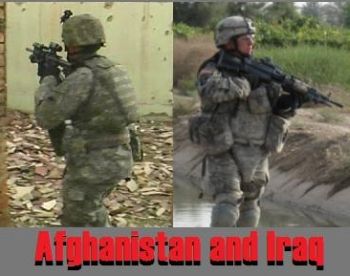 All photos by Tim King Salem-News.com |
(SALEM, Ore.) - Afghanistan and Iraq are disctincly different places, yet they have plenty in common in the minds of American families. Every emotion in the universe can be attached to the wars our men and women are currently fighting.
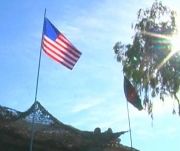 U.S. flag at Camp Joyce; |
Soldiers serving in Afghanistan in 2006 and 2007, told me that they were undermanned and under equipped. The missions I went on during the two months I covered the war, were reached in HUMVEE and 5-ton truck convoys- constantly exposed to the threat of improvised explosive devices or IED's.
In Iraq last summer, almost every ride I took was in an airplane or a helicopter. Air operations in Iraq are constant; literally going around the clock. Patrols with HUMVEE's and the newer MRAP vehicles are always taking place, but they generally go out and come back after several hours on the same day.
Afghanistan air operations are more limited because there are far fewer aircraft. It is also a more challenging aviation environment; Afghanistan is a high elevation country and this demands more from aircraft engines.
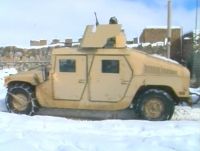 Lead HUMVEE in an Afghan |
When it comes to climate and terrain, there are huge, notable differences between these two places. Many parts of Afghanistan are freezing cold in the winter, whereas Iraq is mildly cold in the winter. Both countries can get extremely hot during the summer, depending on where you are. Interestingly, the worst place of all to be in extreme heat is Kuwait.
Afghan Escalations
As the conflict in Iraq winds down and efforts to wage the war in Afghanistan intensify, we will see an escalation in casualties in this faraway place that has never been dominated by any foreign nation for very long.
Based on what I saw in Afghanistan, the only way to win the hearts and minds is to help people achieve their basic needs. Afghans are desperate for medical care, food, clean water and heat.
The river in Kabul trickles in bubbling shades of brown. Parts of this city once grand have taken a tremendous beating.
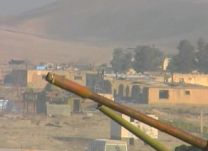 Ruins: Kabul Military Training Ctr. |
Palaces were crumbled, factories were decimated, and Taliban military facilities, buildings constructed by the Soviets during their occupation that began in 1979, were smashed by U.S. Air Force bombs.
Now the war in Afghanistan is really heating up again. The Anti-Coalition Militias including the Taliban are growing in number and have resources and advantages. Helmand Province is largely under Taliban control, and Kandahar, which is the traditional home of some of these fighters.
Even in Kabul, problems are on the rise and parts of the city are not under Coalition control.
The good relationships that western intelligence officers build allow them to gather significantly important information. But these troops are rotated in and rotated out while the Afghan people remain in the same place, watching members of the occupying Army come and go.
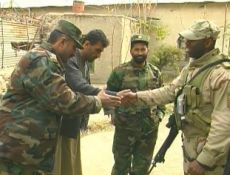 Afghan soldiers shake hand of U.S. |
In order to gain an upper hand in Afghanistan, I believe it will be vital for intelligence officers and soldiers to maintain longer relationships with local contacts in better and more productive ways. Every time a huge rotation takes place, all new soldiers arrive to take the place of those who have been getting to know the area for a year to fifteen months. Suddenly the experienced forces are out, and the locals have new U.S. soldiers patrolling their neighborhoods.
I know for a fact that this system of 'everyone in, everyone out', causes massive problems with regard to the actual war effort. To win in Afghanistan, we will need to be, among many other things... consistent. The latest casualty figures noted below, indicate a five to one ration for deaths in Afghanistan, compared to Iraq.
Afghanistan Casualties
It was announced today that two soldiers who were supporting Operation Enduring Freedom died January 8th in Maywand, Afghanistan, of wounds sustained when their dismounted patrol was hit by an improvised explosive device.
Sergeant Joshua L. Rath, 22, of Decatur, Alabama, and Specialist Keith E. Essary, 20, of Dyersburg, Tennessee, were assigned to the 2nd Battalion, 2nd Infantry Regiment, 3rd Brigade Combat Team, 1st Infantry Division, Fort Hood, Texas.
It was also reported that three soldiers died January 9th in the Zabul Province of Afghanistan, of wounds suffered when an improvised explosive device detonated near their vehicle in Jaldak.
Major Brian M. Mescall, 33, of Hopkinton, Massachusetts, Specialist Joseph M. Hernandez, 24, of Hammond, Indiana and Specialist Jason R. Parsons, 24, of Lenoir, North Carolina, were assigned to the 1st Battalion, 4th Infantry Regiment, Hohenfels, Germany.
One Casualty in Baghdad
The Department of Defense reported today the death of Army Staff Sergeant Justin L. Bauer, 24, of Loveland, Colorado, who died January 10th in Baghdad of wounds he sustained when an improvised explosive device detonated near his vehicle.
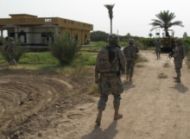 U.S. soldiers patrol in Iraq: '08 |
He was assigned to the 2nd Battalion, 505th Parachute Infantry Regiment, 3rd Brigade Combat Team, 82nd Airborne Division, Fort Bragg, N.C.
The feeling in Iraq today among many of our combat forces, is that Americans have done what they can, and it is time to go.
There are stories about the end of the Vietnam War when U.S. forces were not even allowed to have bullets in their weapons for fear of causing a political reprisal. This may not become the case in Iraq, but it is an active discussion and something many in uniform dread.
In Vietnam, there were also those disagreements between Americans that led to gunfights. That same thing happens from time to time in Iraq.
I had soldiers tell me about full fledged firefights between disgruntled members of their own platoon. I wasn't near it, but a soldier was killed by another at a base north of Baghdad when I was in Balad, Iraq; reportedly in one of these soldier to soldier death matches.
Capitol Cities
Baghdad, Iraq in September of 2008 |
Iraq's "Green Zone" in Baghdad is called the "International Zone" today, and it is mostly peaceful. I was there over the past summer and we walked around without helmets or armored vests in the Iraqi capitol. It is encouraging to soldiers who served in this city during more challenging times.
Baghdad is a magnificent city, in spite of everything it has been through. Buildings are often grand and the war memorials of Saddam Hussein can only be called impressive. One massive building after another lines the streets of this massive city. Traffic flows freely and motorists pass without a checkpoint into the "Red Zone" and back all day and night.
People in Baghdad appear somewhat comfortable and happy. It's something that is hard to tell by just looking, but people smile at you, and they don't try to hide their faces away from the television camera. All things considered, the billions poured into the war in Iraq have at least made a significant part of Baghdad, a safer place.
The capitol of Afghanistan, Kabul, is filthy and at all times dangerous. There are ruins everywhere and people live without electricity and clean water.
Kabul, Afghanistan in November of 06 |
Convoys in Afghanistan are not supposed to stop for any reason here. Drivers in right hand drive and left hand drive cars jockey between the lanes with almost no set rules. Afghan National Police stand at intersections, but they are often powerless in controlling problems and situations like traffic crashes are settled between those involved. Most don't want to have the police intervene in any way.
Roads in Afghanistan have to be among the worst in the world, while Iraq's road system is still mostly intact and functional. Afghanistan always has problems with groups like the Taliban setting up roadblocks and checkpoints. Bandits roam this ancient place also.
Then you have all of the people who appear to be digging holes in the road all over the place. I recall on the convoy from Camp Phoenix in Kabul to a base called Gardez, passing one group of men and/or boys working on the road. You absolutely could not have been sure as to what they were doing without stopping the convoy and physically checking it.
What really stands out in Afghanistan, is the rampant poverty. This sets it apart from Iraq. People here suffered for ten years during the war with the Soviet Union, and then were quickly under Taliban rule. They have not known anything but war for three full decades.
Iraq is also a poor country, especially today, there is no mistaking that. But before we attacked Iraq, it was a functioning society and the government had strong infrastructure in many areas. It was also the most westernized of the predominantly Islamic countries and had the strongest recognition of women's rights. Much of that infrastructure ended with the U.S. invasion. Women in cities like Baghdad still have a somewhat western appearance. Women in Afghanistan in all but rare cases in Kabul and a few other places, wear burqas.
Though these countries are very different, the challenges are all similar. Oregon Governor Ted Kulongoski told me in Kabul during the winter of 2006, that he believes Afghanistan can one day become a functioning democracy, though not a Jeffersonian type democracy as we know and enjoy in the United States.
The trick is to align the country's varying cultural groups around a single national theme. Afghanistan has cultural integration in their ranks right now, and they have made several noteworthy advances. The funding for Afghan forces that could make the difference, has so far been drained by the costly fighting in Iraq. Perhaps in the near future adequate resources for this will exist.
Tim King: Salem-News.com Editor and Writer
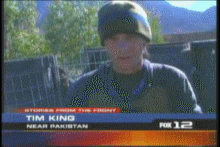
Tim King has more than twenty years of experience on the west coast as a television news producer, photojournalist, reporter and assignment editor. Tim is Salem-News.com's Executive News Editor. His background includes covering the war in Afghanistan in 2006 and 2007, and reporting from the Iraq war in 2008. Tim is a former U.S. Marine who follows stories of Marines and Marine Veterans; he's covered British Royal Marines and in Iraq, Tim embedded with the same unit he served with in the 1980's.
Tim holds awards for reporting, photography, writing and editing from traditional mainstream news agencies like The Associated Press and Electronic Media Association; he also holds awards from the National Coalition of Motorcyclists, the Oregon Confederation of Motorcycle Clubs; and was presented with a 'Good Neighbor Award' for his reporting, by the The Red Cross.
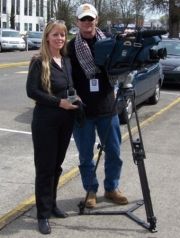 Tim's years as a Human Rights reporter have taken on many dimensions; he has rallied for a long list of cultures and populations and continues to every day, with a strong and direct concentration on the 2009 Genocide of Tamil Hindus and Christians in Sri Lanka. As a result of his long list of reports exposing war crimes against Tamil people, Tim was invited to be the keynote speaker at the FeTNA (Federation of Tamil Sangams of North America) Conference in Baltimore, in July 2012. This is the largest annual gathering of North American Tamils; Tim addressed more than 3000 people and was presented with a traditional Sri Lanka ‘blessed garland’ and a shawl as per the tradition and custom of Tamil Nadu
Tim's years as a Human Rights reporter have taken on many dimensions; he has rallied for a long list of cultures and populations and continues to every day, with a strong and direct concentration on the 2009 Genocide of Tamil Hindus and Christians in Sri Lanka. As a result of his long list of reports exposing war crimes against Tamil people, Tim was invited to be the keynote speaker at the FeTNA (Federation of Tamil Sangams of North America) Conference in Baltimore, in July 2012. This is the largest annual gathering of North American Tamils; Tim addressed more than 3000 people and was presented with a traditional Sri Lanka ‘blessed garland’ and a shawl as per the tradition and custom of Tamil Nadu
In a personal capacity, Tim has written 2,026 articles as of March 2012 for Salem-News.com since the new format designed. Serving readers with news from all over the globe, Tim's life is literally encircled by the endless news flow published by Salem-News.com, where more than 100 writers contribute stories from 23+ countries and regions.
Tim specializes in writing about political and military developments worldwide; and maintains that the label 'terrorist' is ill placed in many cases; specifically with the LTTE Tamil Tigers in Sri Lanka, where it was used as an excuse to slaughter people by the tense of thousands; and in Gaza, where a trapped population lives at the mercy of Israel's destructive military war crime grinder. At the center of all of this, Tim pays extremely close attention to the safety and welfare of journalists worldwide. You can write to Tim at this address: tim@salem-news.com. Visit Tim's Facebook page (facebook.com/TimKing.Reporter)
 |
 |
 |
 |
 |
 |
 |
Articles for January 12, 2009 | Articles for January 13, 2009 | Articles for January 14, 2009




Quick Links
DINING
Willamette UniversityGoudy Commons Cafe
Dine on the Queen
Willamette Queen Sternwheeler
MUST SEE SALEM
Oregon Capitol ToursCapitol History Gateway
Willamette River Ride
Willamette Queen Sternwheeler
Historic Home Tours:
Deepwood Museum
The Bush House
Gaiety Hollow Garden
AUCTIONS - APPRAISALS
Auction Masters & AppraisalsCONSTRUCTION SERVICES
Roofing and ContractingSheridan, Ore.
ONLINE SHOPPING
Special Occasion DressesAdvertise with Salem-News
Contact:AdSales@Salem-News.com
Salem-News.com:
Terms of Service | Privacy Policy
All comments and messages are approved by people and self promotional links or unacceptable comments are denied.
[Return to Top]
©2025 Salem-News.com. All opinions expressed in this article are those of the author and do not necessarily reflect those of Salem-News.com.